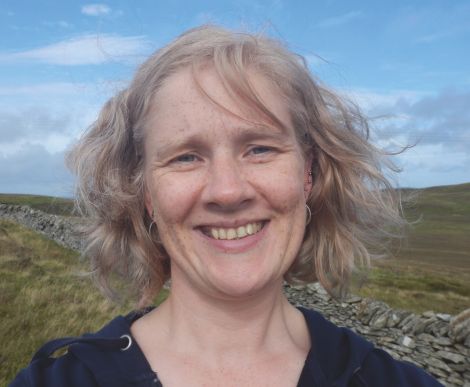Politics / Labour candidate wants to tackle inequality
LABOUR’s Northern Isles election hopeful Robina Barton has highlighted equality as one of her main campaign issues and described the reliance on food banks across the country as “revolting”.
She said her party’s pledge to tax raise income tax on earnings over £80,000 and bring the minimum wage up to £10 an hour will go some way to helping inequality in the UK.
Barton, who came third in last year’s Scottish Parliament election for Shetland, also said that she has encountered “genuine uncertainty” from voters who are unsure who to support come polling day on 8 June.
The Labour Party’s manifesto was released earlier this week by leader Jeremy Corbyn, who called it a “programme of hope”, and Barton told Shetland News that she feels the party’s plans would “set society on a fairer footing”.
Last month Shetland Foodbank revealed demand for its service had increased over the last 12 months and remains significantly higher than the national average, with changes to the benefits system from the Conservative government still the main source of blame.
“When you have massive inequality between the most well off, and the poorest people, then that tends to lead to all sorts of well documented social problems,” Barton said.
“The idea that in 2017 we’re actually relying on food banks to any extent is pretty revolting. Usage of food banks has shot up since 2010.
“What we need to tackle is that inequality so people can actually afford to feed themselves, can afford to heat their homes, can afford a decent standard of living, and that is going to be done ultimately by sharing the welfare more fairly, which really involves helping the people at the lower end to earn more.”
Labour manifesto pledges
Barton, who lives in Bressay and has previously worked in the heritage and tourism sectors, said increasing taxes for the more well off – people “who can afford to put in a little bit more” – is a sensible way to increase revenue.
Become a member of Shetland News
“If public services work well, if our schools are working well and our hospitals are working well and our transport is working well, then we actually end up with a better skilled, more healthy and active workforce, which helps everybody,” she said.
“It helps the economy, and it helps the people at the top to do better as well, so it makes complete sense to pay into the system.”
Locally, Barton – who voted against leaving the EU – said fishermen had “very good reasons” for voting in favour of Brexit and leaving the much-criticised Common Fisheries Policy.
However, she said she is worried that if a Tory government which is leaning towards a ‘hard’ Brexit negotiate leaving terms, then the fishing industry could be low on the list of priorities.
“Fisheries is going to have to be regulated one way or another, partly to ensure the sustainability of the supply, and also because we have to look after our environment,” Barton said.
“So we either have regulation from Europe or Westminster, and I think the problem in either case is that the people who are issuing that legislation don’t fully understand the complexities of the situation in a place like Shetland, where we have a mixed fishery. I think good work has been done with Europe on the Common Fisheries Policy to try to iron out those problems, and I think it’s worth persevering with that.
“But I think if we hand the reins over to Westminster, we might see things even take a downward turn, and certainly in the Brexit negotiations, if the Tories are still in power, it’s very clear they want a hard Brexit, and they’re going to do whatever they have to do to get what they want, and I don’t think the concerns of our fishermen are going to be at the top of the list.”
Voter uncertainty?
Barton said she doesn’t subscribe to the idea that the local election will be a so-called two-horse race between current Liberal Democrat MP Alistair Carmichael and SNP hopeful Miriam Brett, and instead called on voters to soak in all of the candidates’ views and opinions before making their choice.
“I think people have been unhappy with Alistair Carmichael, because of the lie that he told, but that doesn’t mean that they’re necessarily subscribing to the SNP’s view either,” she said.
The Orkney and Shetland election features the first female candidates in the constituency in two decades, and it looks like Brett put up a strong fight against Carmichael, who has held the seat since 2001.
“I think it’s nice to see more women engaged in politics,” Barton said.
“At the moment, the leaders of the Labour Party, the SNP and the Conservatives in Scotland, and indeed the Prime Minister, they’re all women, so that’s certainly a step forward.
“I have a lot of time and respect for Miriam as well. We’re both from Bressay, so I know her as an individual and that she’s a very decent person who believes in trying to make a better world. I just think she’s going about it the wrong way.
“If I could convert her to the Labour Party…I think that might be my mission,” she laughed.
Other candidates vying in the election are the Conservatives’ Jamie Halcro Johnston, Robert Smith of UKIP and Stuart Hill for Shetland and Orkney Sovereignty.
Become a member of Shetland News
Shetland News is asking its readers to consider paying for membership to get additional perks:
- Removal of third-party cookie ads;
- Bookmark posts to read later;
- Exclusive curated weekly newsletter;
- Hide membership messages;
- Comments open for discussion.
If you appreciate what we do and feel strongly about impartial local journalism, then please become a member of Shetland News by either making a single payment, or setting up a monthly, quarterly or yearly subscription.




























































